Marketing Strateg Assignment Solution
VerifiedAdded on 2021/06/17
|8
|2132
|106
AI Summary
Contribute Materials
Your contribution can guide someone’s learning journey. Share your
documents today.
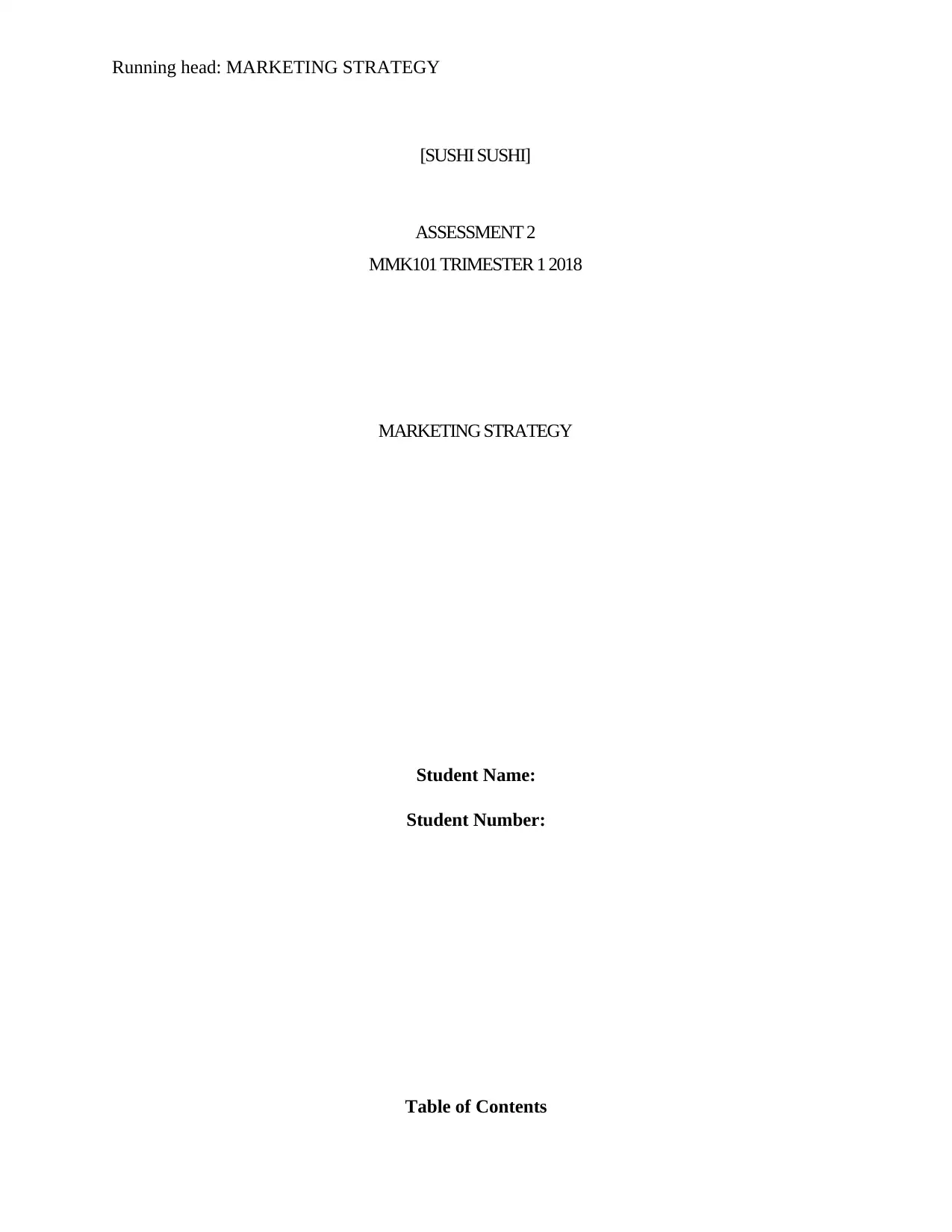
Running head: MARKETING STRATEGY
[SUSHI SUSHI]
ASSESSMENT 2
MMK101 TRIMESTER 1 2018
MARKETING STRATEGY
Student Name:
Student Number:
Table of Contents
[SUSHI SUSHI]
ASSESSMENT 2
MMK101 TRIMESTER 1 2018
MARKETING STRATEGY
Student Name:
Student Number:
Table of Contents
Secure Best Marks with AI Grader
Need help grading? Try our AI Grader for instant feedback on your assignments.
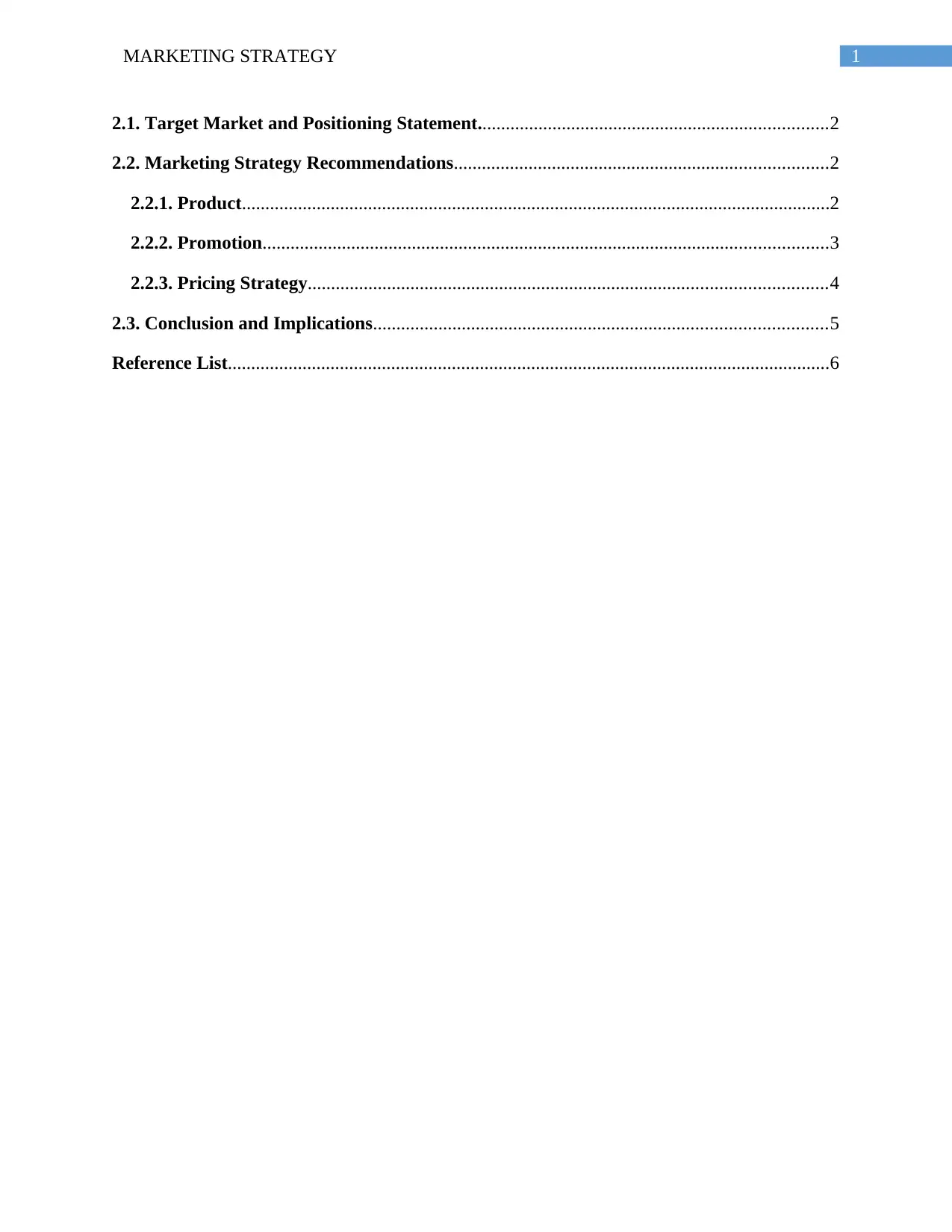
1MARKETING STRATEGY
2.1. Target Market and Positioning Statement...........................................................................2
2.2. Marketing Strategy Recommendations................................................................................2
2.2.1. Product..............................................................................................................................2
2.2.2. Promotion.........................................................................................................................3
2.2.3. Pricing Strategy...............................................................................................................4
2.3. Conclusion and Implications.................................................................................................5
Reference List.................................................................................................................................6
2.1. Target Market and Positioning Statement...........................................................................2
2.2. Marketing Strategy Recommendations................................................................................2
2.2.1. Product..............................................................................................................................2
2.2.2. Promotion.........................................................................................................................3
2.2.3. Pricing Strategy...............................................................................................................4
2.3. Conclusion and Implications.................................................................................................5
Reference List.................................................................................................................................6
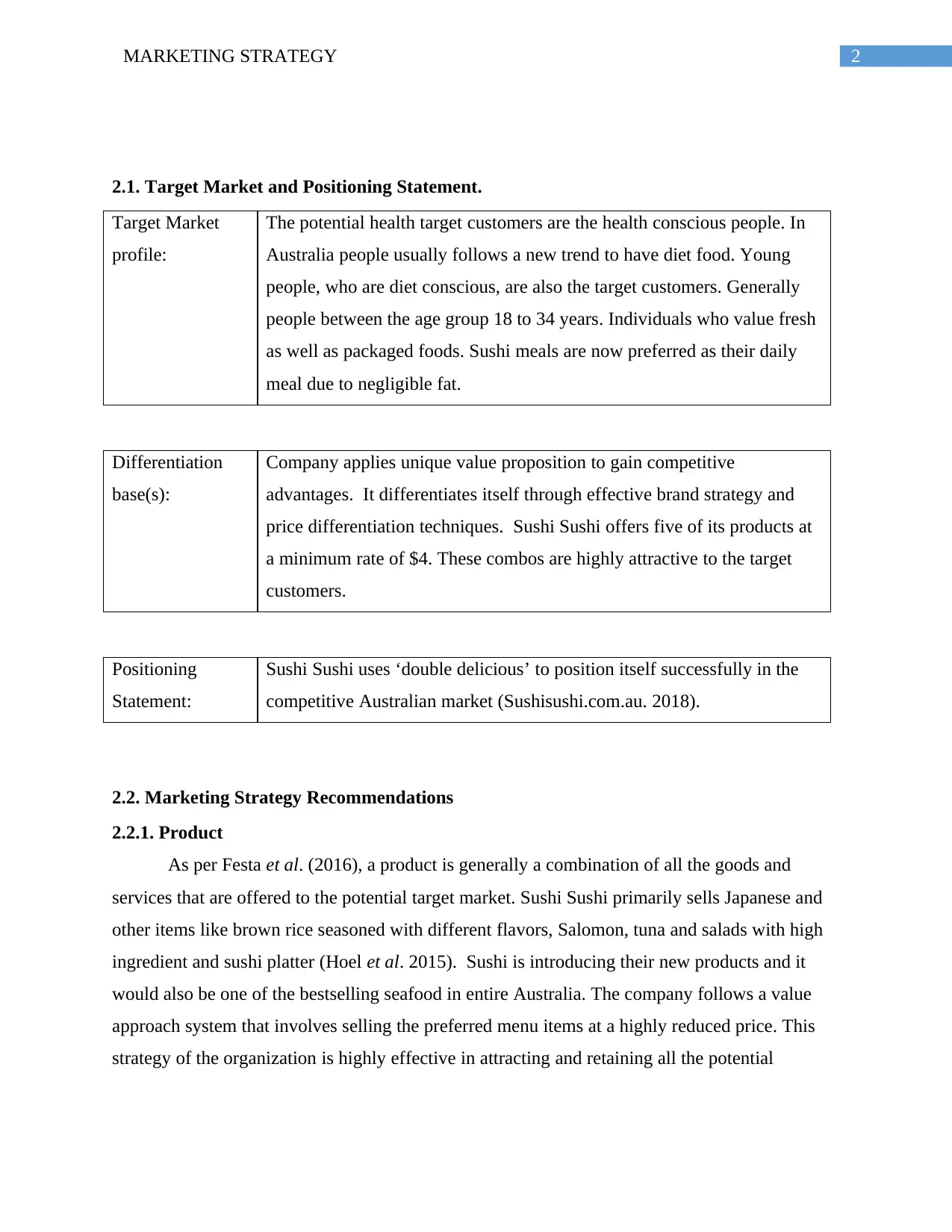
2MARKETING STRATEGY
2.1. Target Market and Positioning Statement.
Target Market
profile:
The potential health target customers are the health conscious people. In
Australia people usually follows a new trend to have diet food. Young
people, who are diet conscious, are also the target customers. Generally
people between the age group 18 to 34 years. Individuals who value fresh
as well as packaged foods. Sushi meals are now preferred as their daily
meal due to negligible fat.
Differentiation
base(s):
Company applies unique value proposition to gain competitive
advantages. It differentiates itself through effective brand strategy and
price differentiation techniques. Sushi Sushi offers five of its products at
a minimum rate of $4. These combos are highly attractive to the target
customers.
Positioning
Statement:
Sushi Sushi uses ‘double delicious’ to position itself successfully in the
competitive Australian market (Sushisushi.com.au. 2018).
2.2. Marketing Strategy Recommendations
2.2.1. Product
As per Festa et al. (2016), a product is generally a combination of all the goods and
services that are offered to the potential target market. Sushi Sushi primarily sells Japanese and
other items like brown rice seasoned with different flavors, Salomon, tuna and salads with high
ingredient and sushi platter (Hoel et al. 2015). Sushi is introducing their new products and it
would also be one of the bestselling seafood in entire Australia. The company follows a value
approach system that involves selling the preferred menu items at a highly reduced price. This
strategy of the organization is highly effective in attracting and retaining all the potential
2.1. Target Market and Positioning Statement.
Target Market
profile:
The potential health target customers are the health conscious people. In
Australia people usually follows a new trend to have diet food. Young
people, who are diet conscious, are also the target customers. Generally
people between the age group 18 to 34 years. Individuals who value fresh
as well as packaged foods. Sushi meals are now preferred as their daily
meal due to negligible fat.
Differentiation
base(s):
Company applies unique value proposition to gain competitive
advantages. It differentiates itself through effective brand strategy and
price differentiation techniques. Sushi Sushi offers five of its products at
a minimum rate of $4. These combos are highly attractive to the target
customers.
Positioning
Statement:
Sushi Sushi uses ‘double delicious’ to position itself successfully in the
competitive Australian market (Sushisushi.com.au. 2018).
2.2. Marketing Strategy Recommendations
2.2.1. Product
As per Festa et al. (2016), a product is generally a combination of all the goods and
services that are offered to the potential target market. Sushi Sushi primarily sells Japanese and
other items like brown rice seasoned with different flavors, Salomon, tuna and salads with high
ingredient and sushi platter (Hoel et al. 2015). Sushi is introducing their new products and it
would also be one of the bestselling seafood in entire Australia. The company follows a value
approach system that involves selling the preferred menu items at a highly reduced price. This
strategy of the organization is highly effective in attracting and retaining all the potential
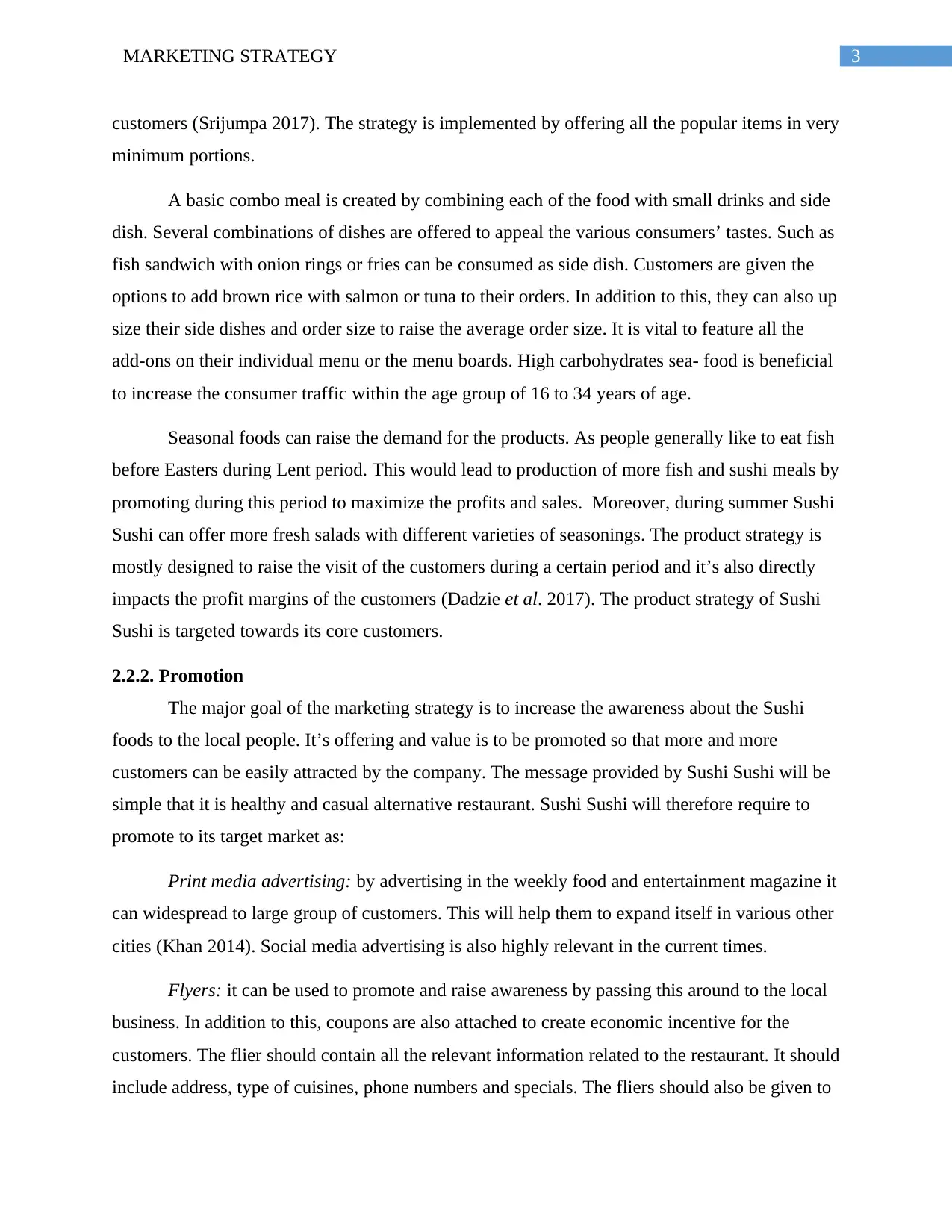
3MARKETING STRATEGY
customers (Srijumpa 2017). The strategy is implemented by offering all the popular items in very
minimum portions.
A basic combo meal is created by combining each of the food with small drinks and side
dish. Several combinations of dishes are offered to appeal the various consumers’ tastes. Such as
fish sandwich with onion rings or fries can be consumed as side dish. Customers are given the
options to add brown rice with salmon or tuna to their orders. In addition to this, they can also up
size their side dishes and order size to raise the average order size. It is vital to feature all the
add-ons on their individual menu or the menu boards. High carbohydrates sea- food is beneficial
to increase the consumer traffic within the age group of 16 to 34 years of age.
Seasonal foods can raise the demand for the products. As people generally like to eat fish
before Easters during Lent period. This would lead to production of more fish and sushi meals by
promoting during this period to maximize the profits and sales. Moreover, during summer Sushi
Sushi can offer more fresh salads with different varieties of seasonings. The product strategy is
mostly designed to raise the visit of the customers during a certain period and it’s also directly
impacts the profit margins of the customers (Dadzie et al. 2017). The product strategy of Sushi
Sushi is targeted towards its core customers.
2.2.2. Promotion
The major goal of the marketing strategy is to increase the awareness about the Sushi
foods to the local people. It’s offering and value is to be promoted so that more and more
customers can be easily attracted by the company. The message provided by Sushi Sushi will be
simple that it is healthy and casual alternative restaurant. Sushi Sushi will therefore require to
promote to its target market as:
Print media advertising: by advertising in the weekly food and entertainment magazine it
can widespread to large group of customers. This will help them to expand itself in various other
cities (Khan 2014). Social media advertising is also highly relevant in the current times.
Flyers: it can be used to promote and raise awareness by passing this around to the local
business. In addition to this, coupons are also attached to create economic incentive for the
customers. The flier should contain all the relevant information related to the restaurant. It should
include address, type of cuisines, phone numbers and specials. The fliers should also be given to
customers (Srijumpa 2017). The strategy is implemented by offering all the popular items in very
minimum portions.
A basic combo meal is created by combining each of the food with small drinks and side
dish. Several combinations of dishes are offered to appeal the various consumers’ tastes. Such as
fish sandwich with onion rings or fries can be consumed as side dish. Customers are given the
options to add brown rice with salmon or tuna to their orders. In addition to this, they can also up
size their side dishes and order size to raise the average order size. It is vital to feature all the
add-ons on their individual menu or the menu boards. High carbohydrates sea- food is beneficial
to increase the consumer traffic within the age group of 16 to 34 years of age.
Seasonal foods can raise the demand for the products. As people generally like to eat fish
before Easters during Lent period. This would lead to production of more fish and sushi meals by
promoting during this period to maximize the profits and sales. Moreover, during summer Sushi
Sushi can offer more fresh salads with different varieties of seasonings. The product strategy is
mostly designed to raise the visit of the customers during a certain period and it’s also directly
impacts the profit margins of the customers (Dadzie et al. 2017). The product strategy of Sushi
Sushi is targeted towards its core customers.
2.2.2. Promotion
The major goal of the marketing strategy is to increase the awareness about the Sushi
foods to the local people. It’s offering and value is to be promoted so that more and more
customers can be easily attracted by the company. The message provided by Sushi Sushi will be
simple that it is healthy and casual alternative restaurant. Sushi Sushi will therefore require to
promote to its target market as:
Print media advertising: by advertising in the weekly food and entertainment magazine it
can widespread to large group of customers. This will help them to expand itself in various other
cities (Khan 2014). Social media advertising is also highly relevant in the current times.
Flyers: it can be used to promote and raise awareness by passing this around to the local
business. In addition to this, coupons are also attached to create economic incentive for the
customers. The flier should contain all the relevant information related to the restaurant. It should
include address, type of cuisines, phone numbers and specials. The fliers should also be given to
Secure Best Marks with AI Grader
Need help grading? Try our AI Grader for instant feedback on your assignments.
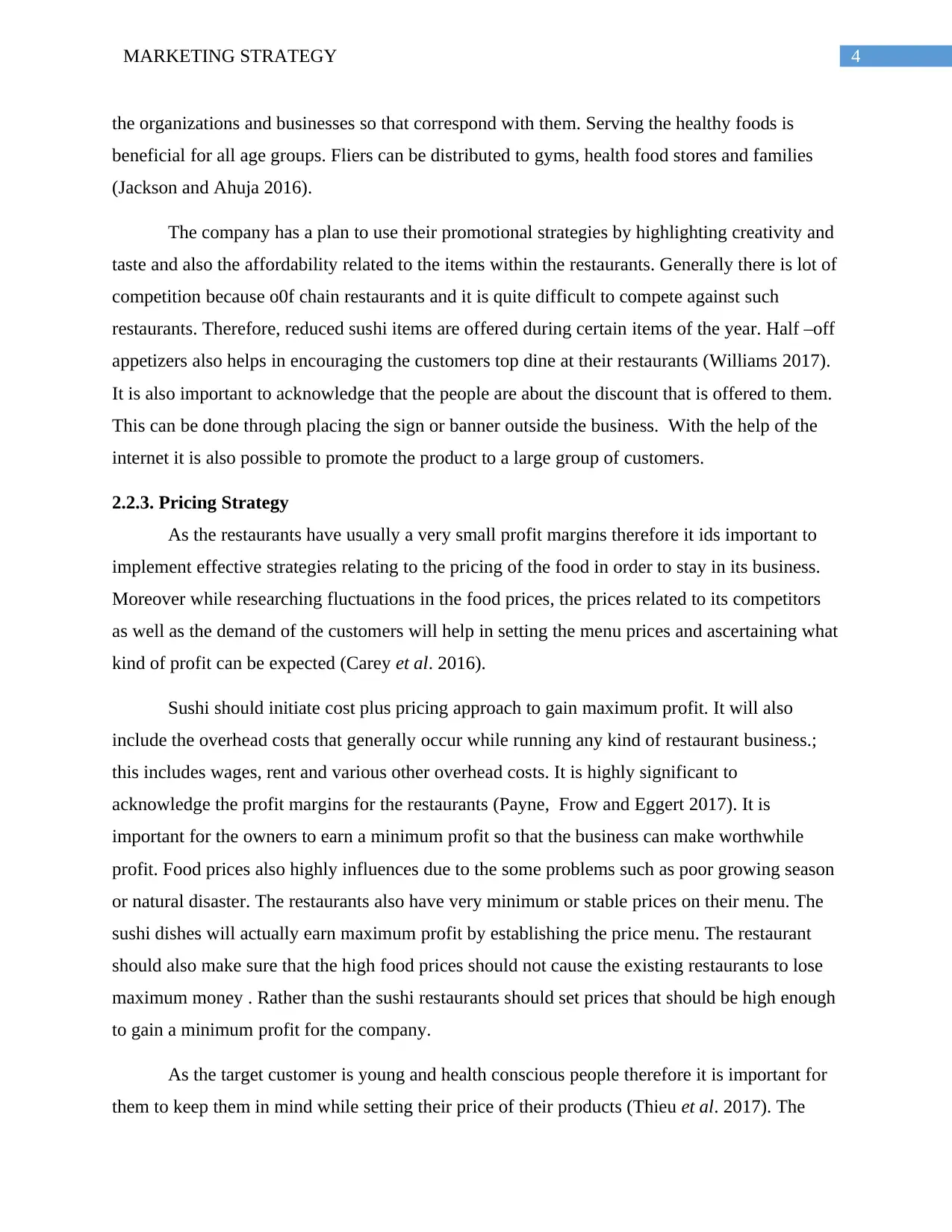
4MARKETING STRATEGY
the organizations and businesses so that correspond with them. Serving the healthy foods is
beneficial for all age groups. Fliers can be distributed to gyms, health food stores and families
(Jackson and Ahuja 2016).
The company has a plan to use their promotional strategies by highlighting creativity and
taste and also the affordability related to the items within the restaurants. Generally there is lot of
competition because o0f chain restaurants and it is quite difficult to compete against such
restaurants. Therefore, reduced sushi items are offered during certain items of the year. Half –off
appetizers also helps in encouraging the customers top dine at their restaurants (Williams 2017).
It is also important to acknowledge that the people are about the discount that is offered to them.
This can be done through placing the sign or banner outside the business. With the help of the
internet it is also possible to promote the product to a large group of customers.
2.2.3. Pricing Strategy
As the restaurants have usually a very small profit margins therefore it ids important to
implement effective strategies relating to the pricing of the food in order to stay in its business.
Moreover while researching fluctuations in the food prices, the prices related to its competitors
as well as the demand of the customers will help in setting the menu prices and ascertaining what
kind of profit can be expected (Carey et al. 2016).
Sushi should initiate cost plus pricing approach to gain maximum profit. It will also
include the overhead costs that generally occur while running any kind of restaurant business.;
this includes wages, rent and various other overhead costs. It is highly significant to
acknowledge the profit margins for the restaurants (Payne, Frow and Eggert 2017). It is
important for the owners to earn a minimum profit so that the business can make worthwhile
profit. Food prices also highly influences due to the some problems such as poor growing season
or natural disaster. The restaurants also have very minimum or stable prices on their menu. The
sushi dishes will actually earn maximum profit by establishing the price menu. The restaurant
should also make sure that the high food prices should not cause the existing restaurants to lose
maximum money . Rather than the sushi restaurants should set prices that should be high enough
to gain a minimum profit for the company.
As the target customer is young and health conscious people therefore it is important for
them to keep them in mind while setting their price of their products (Thieu et al. 2017). The
the organizations and businesses so that correspond with them. Serving the healthy foods is
beneficial for all age groups. Fliers can be distributed to gyms, health food stores and families
(Jackson and Ahuja 2016).
The company has a plan to use their promotional strategies by highlighting creativity and
taste and also the affordability related to the items within the restaurants. Generally there is lot of
competition because o0f chain restaurants and it is quite difficult to compete against such
restaurants. Therefore, reduced sushi items are offered during certain items of the year. Half –off
appetizers also helps in encouraging the customers top dine at their restaurants (Williams 2017).
It is also important to acknowledge that the people are about the discount that is offered to them.
This can be done through placing the sign or banner outside the business. With the help of the
internet it is also possible to promote the product to a large group of customers.
2.2.3. Pricing Strategy
As the restaurants have usually a very small profit margins therefore it ids important to
implement effective strategies relating to the pricing of the food in order to stay in its business.
Moreover while researching fluctuations in the food prices, the prices related to its competitors
as well as the demand of the customers will help in setting the menu prices and ascertaining what
kind of profit can be expected (Carey et al. 2016).
Sushi should initiate cost plus pricing approach to gain maximum profit. It will also
include the overhead costs that generally occur while running any kind of restaurant business.;
this includes wages, rent and various other overhead costs. It is highly significant to
acknowledge the profit margins for the restaurants (Payne, Frow and Eggert 2017). It is
important for the owners to earn a minimum profit so that the business can make worthwhile
profit. Food prices also highly influences due to the some problems such as poor growing season
or natural disaster. The restaurants also have very minimum or stable prices on their menu. The
sushi dishes will actually earn maximum profit by establishing the price menu. The restaurant
should also make sure that the high food prices should not cause the existing restaurants to lose
maximum money . Rather than the sushi restaurants should set prices that should be high enough
to gain a minimum profit for the company.
As the target customer is young and health conscious people therefore it is important for
them to keep them in mind while setting their price of their products (Thieu et al. 2017). The
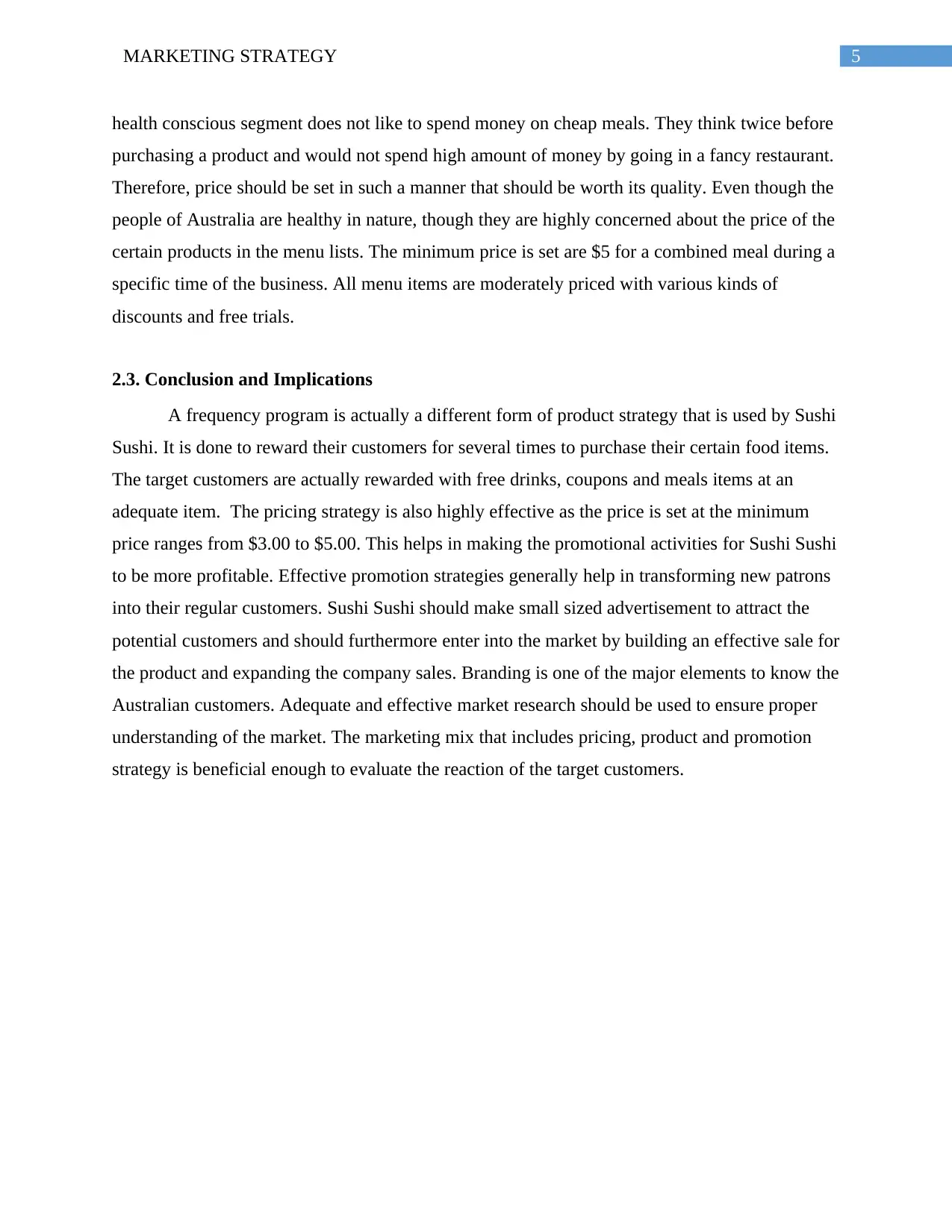
5MARKETING STRATEGY
health conscious segment does not like to spend money on cheap meals. They think twice before
purchasing a product and would not spend high amount of money by going in a fancy restaurant.
Therefore, price should be set in such a manner that should be worth its quality. Even though the
people of Australia are healthy in nature, though they are highly concerned about the price of the
certain products in the menu lists. The minimum price is set are $5 for a combined meal during a
specific time of the business. All menu items are moderately priced with various kinds of
discounts and free trials.
2.3. Conclusion and Implications
A frequency program is actually a different form of product strategy that is used by Sushi
Sushi. It is done to reward their customers for several times to purchase their certain food items.
The target customers are actually rewarded with free drinks, coupons and meals items at an
adequate item. The pricing strategy is also highly effective as the price is set at the minimum
price ranges from $3.00 to $5.00. This helps in making the promotional activities for Sushi Sushi
to be more profitable. Effective promotion strategies generally help in transforming new patrons
into their regular customers. Sushi Sushi should make small sized advertisement to attract the
potential customers and should furthermore enter into the market by building an effective sale for
the product and expanding the company sales. Branding is one of the major elements to know the
Australian customers. Adequate and effective market research should be used to ensure proper
understanding of the market. The marketing mix that includes pricing, product and promotion
strategy is beneficial enough to evaluate the reaction of the target customers.
health conscious segment does not like to spend money on cheap meals. They think twice before
purchasing a product and would not spend high amount of money by going in a fancy restaurant.
Therefore, price should be set in such a manner that should be worth its quality. Even though the
people of Australia are healthy in nature, though they are highly concerned about the price of the
certain products in the menu lists. The minimum price is set are $5 for a combined meal during a
specific time of the business. All menu items are moderately priced with various kinds of
discounts and free trials.
2.3. Conclusion and Implications
A frequency program is actually a different form of product strategy that is used by Sushi
Sushi. It is done to reward their customers for several times to purchase their certain food items.
The target customers are actually rewarded with free drinks, coupons and meals items at an
adequate item. The pricing strategy is also highly effective as the price is set at the minimum
price ranges from $3.00 to $5.00. This helps in making the promotional activities for Sushi Sushi
to be more profitable. Effective promotion strategies generally help in transforming new patrons
into their regular customers. Sushi Sushi should make small sized advertisement to attract the
potential customers and should furthermore enter into the market by building an effective sale for
the product and expanding the company sales. Branding is one of the major elements to know the
Australian customers. Adequate and effective market research should be used to ensure proper
understanding of the market. The marketing mix that includes pricing, product and promotion
strategy is beneficial enough to evaluate the reaction of the target customers.
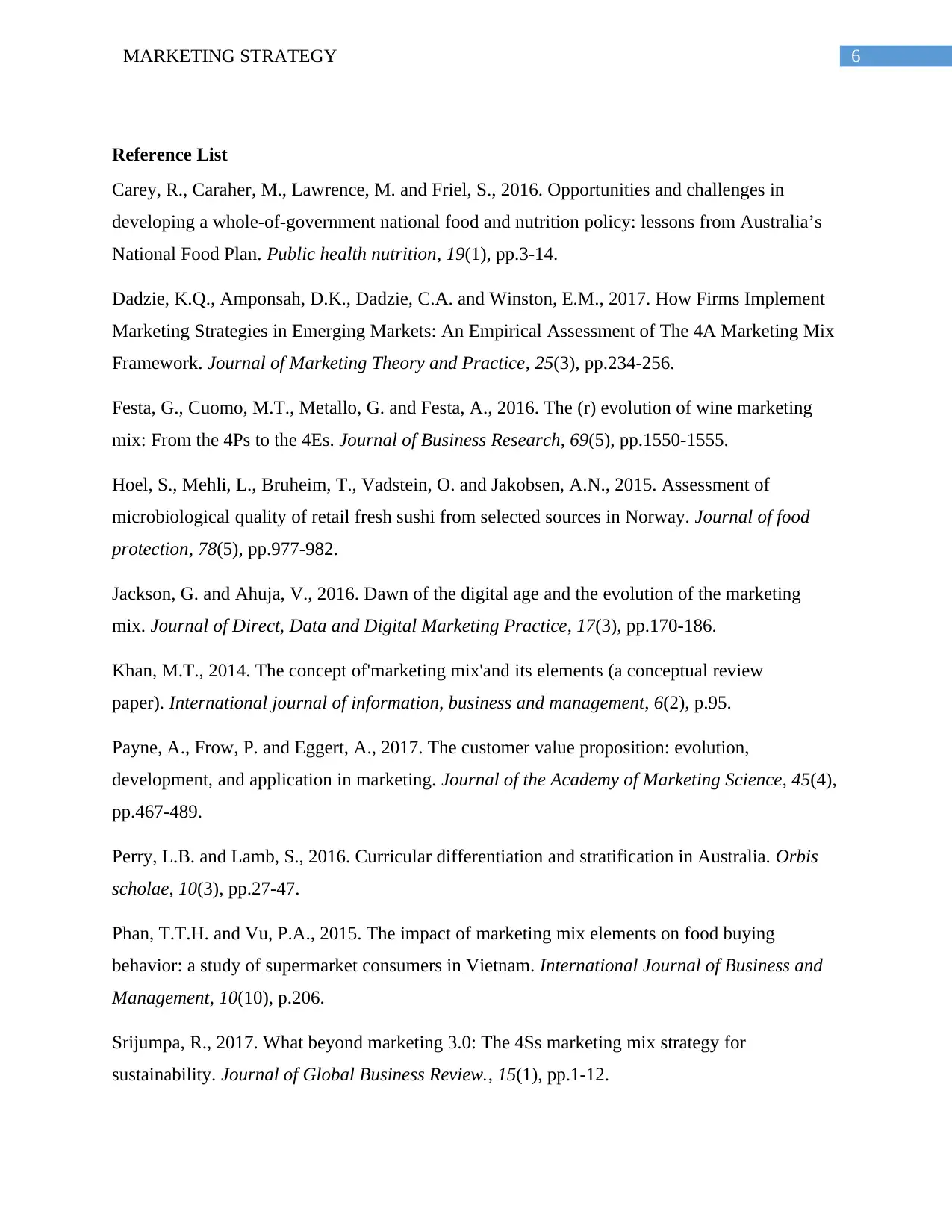
6MARKETING STRATEGY
Reference List
Carey, R., Caraher, M., Lawrence, M. and Friel, S., 2016. Opportunities and challenges in
developing a whole-of-government national food and nutrition policy: lessons from Australia’s
National Food Plan. Public health nutrition, 19(1), pp.3-14.
Dadzie, K.Q., Amponsah, D.K., Dadzie, C.A. and Winston, E.M., 2017. How Firms Implement
Marketing Strategies in Emerging Markets: An Empirical Assessment of The 4A Marketing Mix
Framework. Journal of Marketing Theory and Practice, 25(3), pp.234-256.
Festa, G., Cuomo, M.T., Metallo, G. and Festa, A., 2016. The (r) evolution of wine marketing
mix: From the 4Ps to the 4Es. Journal of Business Research, 69(5), pp.1550-1555.
Hoel, S., Mehli, L., Bruheim, T., Vadstein, O. and Jakobsen, A.N., 2015. Assessment of
microbiological quality of retail fresh sushi from selected sources in Norway. Journal of food
protection, 78(5), pp.977-982.
Jackson, G. and Ahuja, V., 2016. Dawn of the digital age and the evolution of the marketing
mix. Journal of Direct, Data and Digital Marketing Practice, 17(3), pp.170-186.
Khan, M.T., 2014. The concept of'marketing mix'and its elements (a conceptual review
paper). International journal of information, business and management, 6(2), p.95.
Payne, A., Frow, P. and Eggert, A., 2017. The customer value proposition: evolution,
development, and application in marketing. Journal of the Academy of Marketing Science, 45(4),
pp.467-489.
Perry, L.B. and Lamb, S., 2016. Curricular differentiation and stratification in Australia. Orbis
scholae, 10(3), pp.27-47.
Phan, T.T.H. and Vu, P.A., 2015. The impact of marketing mix elements on food buying
behavior: a study of supermarket consumers in Vietnam. International Journal of Business and
Management, 10(10), p.206.
Srijumpa, R., 2017. What beyond marketing 3.0: The 4Ss marketing mix strategy for
sustainability. Journal of Global Business Review., 15(1), pp.1-12.
Reference List
Carey, R., Caraher, M., Lawrence, M. and Friel, S., 2016. Opportunities and challenges in
developing a whole-of-government national food and nutrition policy: lessons from Australia’s
National Food Plan. Public health nutrition, 19(1), pp.3-14.
Dadzie, K.Q., Amponsah, D.K., Dadzie, C.A. and Winston, E.M., 2017. How Firms Implement
Marketing Strategies in Emerging Markets: An Empirical Assessment of The 4A Marketing Mix
Framework. Journal of Marketing Theory and Practice, 25(3), pp.234-256.
Festa, G., Cuomo, M.T., Metallo, G. and Festa, A., 2016. The (r) evolution of wine marketing
mix: From the 4Ps to the 4Es. Journal of Business Research, 69(5), pp.1550-1555.
Hoel, S., Mehli, L., Bruheim, T., Vadstein, O. and Jakobsen, A.N., 2015. Assessment of
microbiological quality of retail fresh sushi from selected sources in Norway. Journal of food
protection, 78(5), pp.977-982.
Jackson, G. and Ahuja, V., 2016. Dawn of the digital age and the evolution of the marketing
mix. Journal of Direct, Data and Digital Marketing Practice, 17(3), pp.170-186.
Khan, M.T., 2014. The concept of'marketing mix'and its elements (a conceptual review
paper). International journal of information, business and management, 6(2), p.95.
Payne, A., Frow, P. and Eggert, A., 2017. The customer value proposition: evolution,
development, and application in marketing. Journal of the Academy of Marketing Science, 45(4),
pp.467-489.
Perry, L.B. and Lamb, S., 2016. Curricular differentiation and stratification in Australia. Orbis
scholae, 10(3), pp.27-47.
Phan, T.T.H. and Vu, P.A., 2015. The impact of marketing mix elements on food buying
behavior: a study of supermarket consumers in Vietnam. International Journal of Business and
Management, 10(10), p.206.
Srijumpa, R., 2017. What beyond marketing 3.0: The 4Ss marketing mix strategy for
sustainability. Journal of Global Business Review., 15(1), pp.1-12.
Paraphrase This Document
Need a fresh take? Get an instant paraphrase of this document with our AI Paraphraser
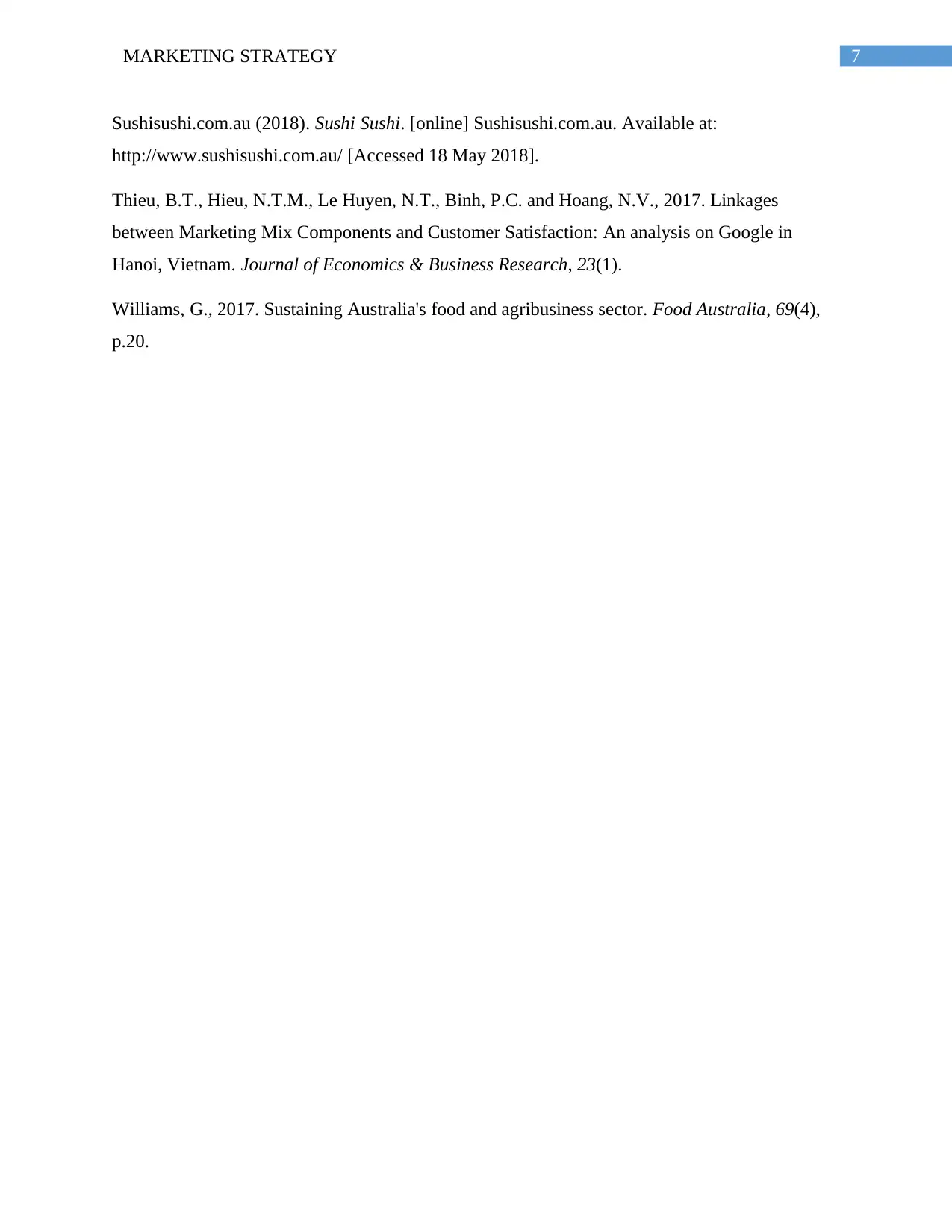
7MARKETING STRATEGY
Sushisushi.com.au (2018). Sushi Sushi. [online] Sushisushi.com.au. Available at:
http://www.sushisushi.com.au/ [Accessed 18 May 2018].
Thieu, B.T., Hieu, N.T.M., Le Huyen, N.T., Binh, P.C. and Hoang, N.V., 2017. Linkages
between Marketing Mix Components and Customer Satisfaction: An analysis on Google in
Hanoi, Vietnam. Journal of Economics & Business Research, 23(1).
Williams, G., 2017. Sustaining Australia's food and agribusiness sector. Food Australia, 69(4),
p.20.
Sushisushi.com.au (2018). Sushi Sushi. [online] Sushisushi.com.au. Available at:
http://www.sushisushi.com.au/ [Accessed 18 May 2018].
Thieu, B.T., Hieu, N.T.M., Le Huyen, N.T., Binh, P.C. and Hoang, N.V., 2017. Linkages
between Marketing Mix Components and Customer Satisfaction: An analysis on Google in
Hanoi, Vietnam. Journal of Economics & Business Research, 23(1).
Williams, G., 2017. Sustaining Australia's food and agribusiness sector. Food Australia, 69(4),
p.20.
1 out of 8
Related Documents
Your All-in-One AI-Powered Toolkit for Academic Success.
+13062052269
info@desklib.com
Available 24*7 on WhatsApp / Email
![[object Object]](/_next/static/media/star-bottom.7253800d.svg)
Unlock your academic potential
© 2024 | Zucol Services PVT LTD | All rights reserved.





